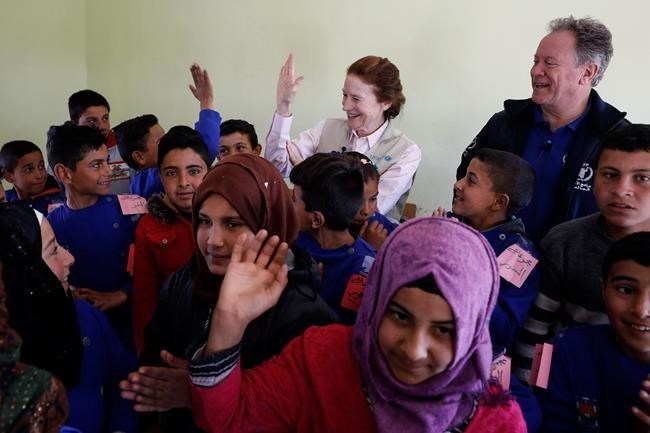
In This picture taken on March 3, 2020 and provided by UNICEF, UNICEF Executive Director Henrietta H. Fore, left background, and WFP Executive Director, David Beasley, right background, interact with 3rd grade children, at Tal-Amara school, southern Idlib, Syria. Fore expressed hope in an interview with The Associated Press on Friday that a cease-fire that went into effect in Syria will hold so that children can return to normal life adding that nearly one third of Syria's children are out of school. Fore visited Syria this week where she met officials and toured villages on the edge of the northwestern province of Idlib. (Omar Sanadiki/UNICEF via AP )
March 06, 2020 - 11:23 AM
BEIRUT - The head of the U.N. children's agency said Friday she has asked government officials for more access inside Syria, saying it's critical to bring aid to "the most vulnerable" in the war-torn country, which is experiencing one of the conflict's worst humanitarian crises yet.
Henrietta Fore, UNICEF's executive director, spoke with The Associated Press following a two-day visit to Syria where she toured areas close to the northwestern province of Idlib, the country's last remaining rebel stronghold. A punishing Russian-backed government offensive on the province that began in December displaced nearly a million people and left hundreds of civilians dead.
Fighting stopped at midnight Thursday following a cease-fire agreement reached between Russia and Turkey. The two countries support rival groups in the conflict and in recent years became the main power brokers in Syria. There are concerns in Idlib that the cease-fire might not hold for as long as previous truces that collapsed, leading to waves of violence.
"We do hope that this will hold," said Fore from southern Turkey. "That is the most important thing for the children and for their families. We need to have a cessation of all hostilities and we need it now."
Many of those families currently in Idlib have been displaced from other parts of Syria as President Bashar Assad's forces made gains on the ground in recent years with the help of their Russian and Iranian allies.
"These families, some of them have moved three, four, five, six, times. It's just too much for a family, it's just too much for a child. There are mental health ramifications for children if you move them that often," Fore said.
Fore and David Beasley, executive director of the World Food Program, met Syrian officials including Foreign Minister Walid al-Moallem who told them that Damascus is ready to facilitate their work in the country, according to state media.
A financial and economic crisis in Syria and neighbouring Lebanon has also had negative repercussions on Syrians.
A U.N. statement said the economic crisis is pushing millions of people into hunger and food insecurity, in which they lack reliable access to enough affordable, nutritious food. According to the U.N., the number of food insecure people increased from 6.5 million to 7.9 million, and food prices spiked by 60% between 2018 and 2019.
Fore said U.N. agencies need access not only in Idlib but also northeastern Syria where there are some 28,000 children from over 60 countries in the al-Hol camp that is hosting more than 60,000 people mostly wives, widows and children of members of the Islamic State group.
Earlier this year, Russia scored a victory for its ally, the Syrian government, when it used its veto threat to force the U.N. Security Council to adopt a resolution significantly reducing the delivery of cross-border humanitarian aid and cutting off critical medical assistance to over a million Syrians.
The resolution adopted by the U.N.’s most powerful body reduces the number of crossing points for aid deliveries from four to just two, from Turkey to the mainly rebel-held northwest, as Russia demanded.
Beasley said they are asking "all sides to give us the access we need, whether it's Russian military, whether it's Turkey, whether it's the United States, the Syrian government."
"No matter who controls what area, we're asking for more access to reach more people," Beasley said.
Fore called for the repatriation of children from al-Hol camp, where children don't go to schools and many are being taught extreme Islamic State ideology. "They need to have homes. They need to not be stateless," she said.
Western countries, including the United States, have refused to repatriate citizens who travelled to the Middle East to join IS, fearing they may not have enough evidence to convict them in criminal courts.
"We are continuously asking for access. We are asking that every country repatriate the children and their mothers" Fore said, adding that many of those in al-Hol are without identification.
____
Associated Press writer Karin Laub contributed from Amman, Jordan.
News from © The Associated Press, 2020